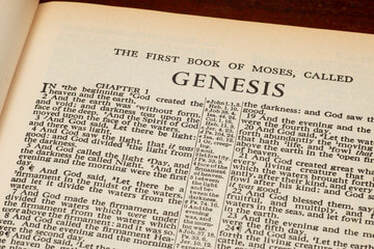
SUMMARY of GENESIS - The Book of Beginnings
Why is There Suffering and Evil in the World? God created a good and perfect world. Man's rebellion against the Creator introduced decay, disease, suffering and death into the world. Who Wrote Genesis? Genesis was written by Moses, after the Exodus from Egypt (about 1445 B.C.). When Did These Things Happen? Genesis covers over 2,000 years of history, more than all other books of the Bible combined. Where Are the Main Places in Genesis? Eden, Ararat, Babel, Ur, Canaan and Egypt. (Present day Iraq, Syria, Jordan, Turkey, Lebanon, Israel and Egypt).
0 Comments
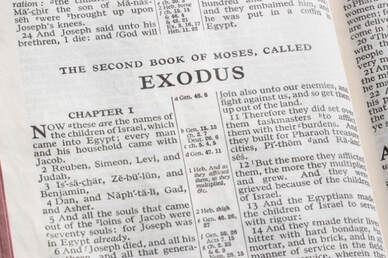
"I am the Lord your God who brought you out of the land of Egypt, out of the house of bondage. You shall have no other gods before Me." Exodus 20:2-3
The Outline
The Message of Exodus
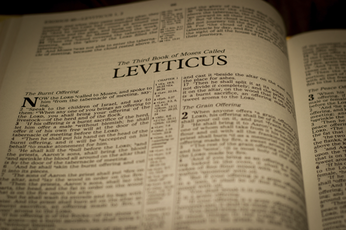
"You shall be holy, for I the Lord Your God am Holy." Leviticus 19:2
Genesis is a universal Book and it covers many centuries. Exodus, focuses on the Israelites deliverance from Egypt and it covers years. Leviticus deals with the priestly tribe of Levi and it covers just one month. In Genesis we see man ruined. In Exodus we see man redeemed. In Leviticus we see man reverencing God. Most of Leviticus is made up of direct instructions from Almighty God. More than any other Book in the Bible, Leviticus contains the Words of God to His people as to how a sinful people can be reconciled to a Holy God, and how to worship God acceptably. In the second half of Exodus, the Tabernacle is built. Leviticus focuses on how to worship God and how to live out our Faith in society. Exodus talks about God's approach to man. Leviticus deals with man's approach to God. Exodus is about the deliverance that God brought to His people. Leviticus is about the dedication of God's people to Him. Exodus is about God's grace in setting His people free. Leviticus shows how His people can show their gratitude to God for being set free. 
"Be sure your sin will find you out." Numbers 32:23
In Genesis we see man ruined. In Exodus we see man redeemed. In Leviticus we see man reverencing God. In Numbers we see man rebelling against God. Wilderness Wanderings The Promised Land of Canaan was a mere 11 days march from Egypt. However, because of the negative and discouraging reports brought back by 10 of the 12 scouts, and because the people of Israel chose to ignore the positive report brought back by 2 of the scouts, Joshua and Caleb, the Israelites grumbled and rebelled against God, and it actually took them 13,780 days. Because of their disbelief and disobedience, God declared that, with the exception of the two faithful scouts, Joshua and Caleb, every one of that rebellious generation over 20 years old, would die before the nation of Israel would enter the Promised Land. A new generation was trained and disciplined in the wilderness to conquer the Promised Land, 40 years after the Exodus from Egypt. "Now these things became our examples, to the intent that we should not lust after evil things as they also lusted." 1 Corinthians 10:6 Bad Examples Numbers provides many examples of how not to behave as the people of God. The 10 unfaithful scouts gave a negative report, which so discouraged the people that they wept aloud, grumbled against Moses and Aaron, and wanted to stone them to death. They declared that they would rather have died in Egypt! The people dismissed the exhortation of the faithful scouts, Joshua and Caleb, who said: "Let us go up at once and take possession, for we are well able to overcome it." Numbers 13:30. They wanted to go back to Egypt! 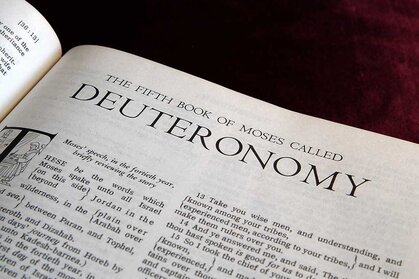
"And now, Israel, what does the Lord your God require of you, but to fear the Lord your God, to walk in all His ways and to love Him, to serve the Lord your God with all your heart, and with all your soul." Deuteronomy 10:12
Name Deuteronomy comes from two Greek words: Deutero, meaning second and Nomos, meaning Law. Deuteronomy is the second giving of the Law. A New Generation Deuteronomy is the fifth book of Moses, the final book of the Pentateuch. After 40 years of wilderness wanderings, the entire generation of those who, through disbelief and disobedience, were condemned by God to die in the Wilderness, had passed away. With the exception of Moses, Joshua and Caleb, every adult over the age of 20, who came out of Egypt and crossed the Red Sea had died. Now a new generation had arisen, trained, by instruction and discipline. They were on the East bank of the Jordan River, poised to enter the Promised Land. Graduation Speech Moses had forfeited his right to enter the land because he had disobeyed God concerning the provision of water from the Rock. This then is Moses' farewell address. He reminds them of their history, reiterates the Law of God, and warns them of the consequences of disobeying the Word of God. 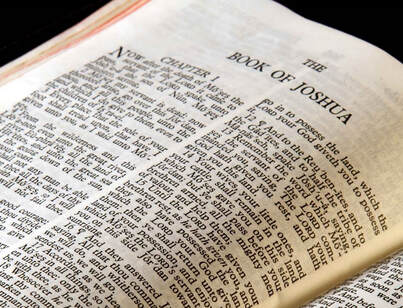
"…And you know in all your hearts and in all your souls that not one thing has failed of all the good things which the Lord your God spoke concerning you. All have come to pass for you; not one word of them has failed." Joshua 23:14
Saved to Serve Joshua is a Book of Faith and obedience, where God's people are united in following His anointed leader. The Word of God is central. Joshua is a book of conquest and victory. Crossing the Jordan Some Christians have imagined that the Promised Land symbolises Heaven. One famous hymn contains the line: "When I tread the verge of Jordan, bid my anxious fears subside" depicting the river Jordan as passing through death, from this world to Heaven. However, that is a misunderstanding. While many Christians do indeed seem to wander in the wilderness, between their conversion, but not quite entering into a balanced discipleship, that is not the way it is meant to be! Spiritual Warfare Across the river lay many enemies, much warfare, sacrifice, injuries and death. Entering into the Promised Land was rest from slavery, but it was hardly passivity, or inactivity. Occupying the Promised Land required real, serious warfare. So too a balanced Christian life of discipleship involves much spiritual warfare, fighting the good fight of Faith. "Be strong and of good courage… Only be strong and very courageous, that you may observe to do according to all the Law which Moses My servant commanded you; do not turn from it to the right hand, or to the left, that you may prosper wherever you go. This Book of the Law shall not depart from your mouth, but you shall meditate in it day and night… Have I not commanded you? Be strong and of good courage; do not be afraid, nor be dismayed, for the Lord your God is with you wherever you go." Joshua 1:6-9 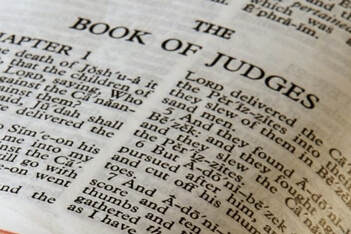
"Now these are the nations which the Lord left, that He might test Israel by them, that is, all who had not known any of the wars in Canaan. (This was only so that the generations of the children of Israel might be taught to know war, at least those who had not formerly known it)." Judges 3:1-2
The two great themes of Judges are: The Faithfulness of the Covenant keeping God and The unfaithfulness of the Covenant breaking people. Judges is a record of man's sin, God's judgement, and God's grace and deliverance. In each section we can ask: What is God's Word of promise and command? What is man's response (rebellion, or faithful obedience)? What is God's response (blessing, or judgement)? Judges show us man's potential for greatness and capacity for catastrophe. Contrasts Joshua is a book of conquest, Judges a book of defeat. Joshua is a book of Faith, Judges a book of unbelief. Joshua is a book of obedience, Judges a book of disobedience. In Joshua, God's people are united in following God. In Judges, there is division and ultimately anarchy. In Joshua, God's Word is central, in Judges, God's Word is neglected. Judges is a book of both failure and Faith. 
"Wherever you go, I will go; and wherever you lodge, I will lodge; your people shall be my people, and your God, my God." Ruth 1:16
A Famine in the Land In the days when the Judges ruled, there was a famine in the land of Israel. Elimelech took his wife, Naomi and their two sons, Mahlon and Chilion, away from Bethlehem, Judea, to the country of Moab. Bethlehem means 'the house of bread' and yet there was famine in Bethlehem. The land flowing with milk and honey was being judged by the Lord with famine. The name Elimelech means 'my God a King'. Naomi means 'pleasant'. However, their childrens' names were Mahlon (sickness) and Chilion (consumption). It must have been a terrible time in the history of Israel. The rabbis of Israel believed that Elimelech's family left Israel in the days of Ehud, and that Naomi and Ruth returned during the judgeship of Deborah. It is also believed that Samuel edited and included the book of Ruth in the Scriptures. Disobedience Leads to Disaster By taking his family for so long into the land of the heathen, Elimelech dishonoured God and set a bad example. His sons married Moabite women and Orpah is said to have returned to her gods (1:15). It does not appear that the Moabite women converted to the Jewish religion before their marriage to the sons of Elimelech. Naomi lost her husband Elimelech, and then her children. The country of Moab now held no attraction at all. Naomi determined to return to Bethlehem. 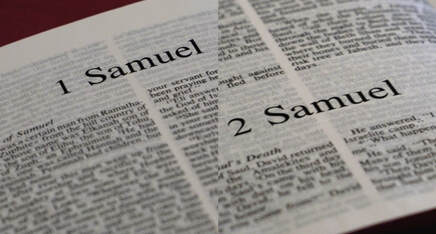
"Speak Lord, for your servant listens…" 1 Samuel 3:9
Leaders of Israel From 2000 to 1500 B.C. Israel was led by Patriarchs. From 1500 to 1000 B.C. they were led by Prophets. From 1000 to 500 B.C. they were led by Princes (or Kings). In the 500 years leading up to the time of Christ, they were led by Priests. Main Characters First Samuel begins with Hannah, the anxious wife, desperate to have a child, Eli, the ailing high priest, Israel the arrogant army, and Saul, the anointed king. The main characters in the first Book of Samuel are: Samuel - the last judge; Saul - the first king; David - the best king of Israel and Jonathan, the adventurous son of King Saul. Samuel, the prophet, pronounced God's judgement upon Saul, and anointed David as the future king. David, the steadfast shepherd, the skilled musician, the superb warrior, then the suspected courtier, the stalked outlaw, and the soldier in exile. 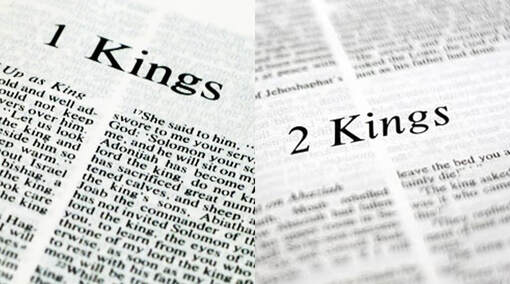
"How long will you falter between two opinions? If the Lord is God, follow Him; but if Baal, follow him." 1 Kings 18:21
1 Samuel: Samuel to King Saul. 2 Samuel: reign of King David. 1 Kings: Solomon to Ahab. 2 Kings: Ahab to Zedekiah. The Kingdom of Israel The Kingdom of Israel went through three stages: 1. United Kingdom:
2. Divided Kingdom:
3. Single Kingdom:
The Books of 1 & 2 Kings cover 400 years. |
OLD
TESTAMENT SURVEY ARTICLES
All
ARCHIVES |

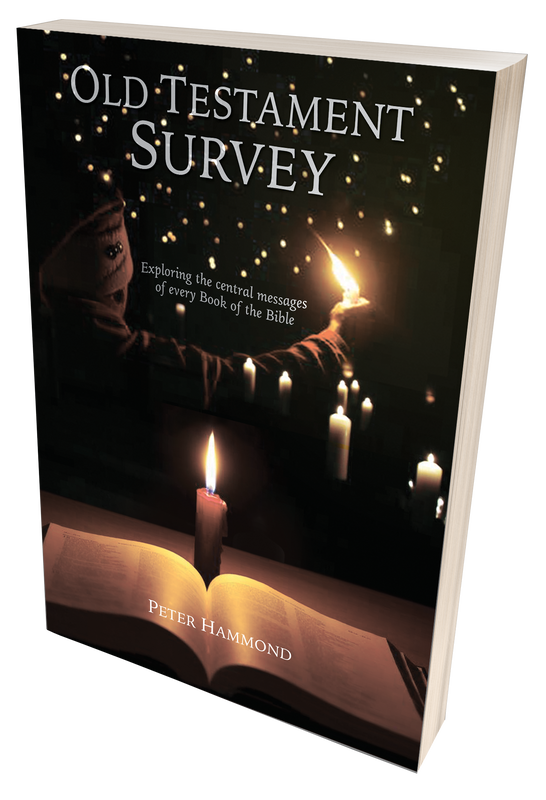
 RSS Feed
RSS Feed